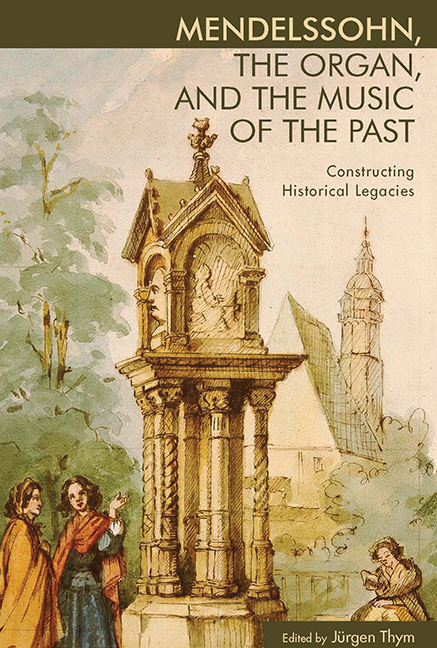Book contents
- Frontmatter
- Dedication
- Contents
- Acknowledgments
- Introduction: Of Statues and Monuments
- Part One Composition and Tradition
- Part Two Mendelssohn and the Organ
- Part Three Mendelssohn's Inherited Legacies in Context
- 8 The Bach Tradition among the Mendelssohn Ancestry
- 9 Music History as Sermon: Style, Form, and Narrative in Mendelssohn's “Dürer” Cantata (1828)
- 10 Mendelssohn's “Authentic” Handel in Context: German Approaches to Translation and Art and Architectural Restoration in the Early Nineteenth Century
- 11 Beyond the Ethical and Aesthetic: Reconciling Religious Art with Secular Art-Religion in Mendelssohn's “Lobgesang”
- 12 Mendelssohn's Religious Worlds: Currents and Crosscurrents of Protestantism in Nineteenth-Century Germany and Great Britain
- List of Contributors
- Index
9 - Music History as Sermon: Style, Form, and Narrative in Mendelssohn's “Dürer” Cantata (1828)
from Part Three - Mendelssohn's Inherited Legacies in Context
Published online by Cambridge University Press: 14 March 2018
- Frontmatter
- Dedication
- Contents
- Acknowledgments
- Introduction: Of Statues and Monuments
- Part One Composition and Tradition
- Part Two Mendelssohn and the Organ
- Part Three Mendelssohn's Inherited Legacies in Context
- 8 The Bach Tradition among the Mendelssohn Ancestry
- 9 Music History as Sermon: Style, Form, and Narrative in Mendelssohn's “Dürer” Cantata (1828)
- 10 Mendelssohn's “Authentic” Handel in Context: German Approaches to Translation and Art and Architectural Restoration in the Early Nineteenth Century
- 11 Beyond the Ethical and Aesthetic: Reconciling Religious Art with Secular Art-Religion in Mendelssohn's “Lobgesang”
- 12 Mendelssohn's Religious Worlds: Currents and Crosscurrents of Protestantism in Nineteenth-Century Germany and Great Britain
- List of Contributors
- Index
Summary
In the spring of 1828 the Royal Academy of the Arts in Berlin commissioned the nineteen-year-old Felix Mendelssohn Bartholdy to compose a grand cantata for the official ceremonies commemorating the tercentenary of the death of Albrecht Dürer (1471–1528). The existence of this cantata is hardly a secret; it is mentioned in every major Mendelssohn biography and many minor ones. Yet most biographers, undaunted by the fact that they have neither seen nor heard the music, have dismissed it as an occasional piece based on an inferior text by a mediocre court poet. Indeed, the cantata remained unpublished until 2012, and apart from a 1995 DMA dissertation on it and the 1822 Gloria (MWV A1), the only source to have consulted the score and discussed it with any thoroughness is Larry Todd's authoritative Mendelssohn biography. Since neither of those contexts permitted the sort of detailed examination that a seventyminute cantata for soloists, chorus, and full orchestra contemporaneous with masterpieces such as the Midsummer Night's Dream overture (MWV P3, op. 21), the Hebrides overture (MWV P7, op. 26), and the Symphonies in D minor and A major (MWV N15 and N16, opp. posth. 107 and 90, respectively, also known as “Reformation” and “Italian”) warrants, the secular cantata that resulted from Mendelssohn's first commission remains obscure.
No amount of explanation and apology is likely to change the fact that to assign the text of this cantata to the annals of literary mediocrity would be an insult to the annals of literary mediocrity. Nevertheless, musical settings of texts can be better than the texts themselves. Mendelssohn's Große Festmusik zum Dürer-Fest (MWV D1) thus warrants closer examination than it has heretofore been accorded—if only because of its significance in his career and the importance of the event for which it was written. The method and the premise for approaching the work are simple: since Mendelssohn's music naturally reflects the text and the text was in turn directly tailored to the occasion of the festivities, that text and its relationship to the contemporary context offer a glimpse into Mendelssohn's compositional goals and strategies in setting it and addressing himself to the tercentenary of Dürer's death as that momentous occasion was understood in Prussia in the 1820s.
- Type
- Chapter
- Information
- Mendelssohn, the Organ, and the Music of the PastConstructing Historical Legacies, pp. 224 - 263Publisher: Boydell & BrewerPrint publication year: 2014



